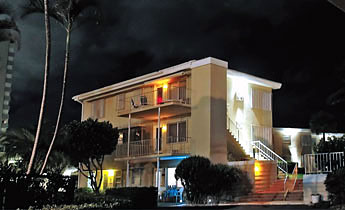Bishop Pelotte Recollects Day He Was Injured
By Marianne Armshaw
Gallup Independent
September 21, 2007
http://www.gallupindependent.com/2007/september/092107mafti_pelotte.html
Lauderdale-By-The-Sea, Fla. — Roman Catholic Bishop Donald E. Pelotte answered the door of his beach-front apartment Thursday wearing a maroon T-shirt, olive walking shorts and scabs on his right knee.
"I've been packing," he said. "I'm going home tomorrow."
During a polite, 10-minute interview, Pelotte repeatedly stated he did not want more printed about his story, but spoke frankly about his health, his immediate plans and the injuries that kept him hospitalized for a month. He firmly declined requests for a photographer to take his portrait.
Though Pelotte spoke animatedly and stood throughout the interview, he seemed to tire quickly. Every few minutes, the soft-spoken, 62-year-old cleric would lean against one of the dining-area chairs. Pelotte has been living in his modestly decorated condo with the view of palm trees, sand and lightning streaking from dark clouds none too far out in the Atlantic.
 |
| The Florida beachfront home of Bishop Donald Pelotte, Roman Catholic Bishop of Gallup New Mexico. Pelotte owns unit 1-S, a third-story apartment in the 1960's-era private Sea Colony cooperative located on a barrier island north of Fort Lauderdale in Broward County, Florida. Photo by Marianne Armshaw |
He said doctors had advised him to recuperate at the 1950s-era beach-front retreat passed on to him by elderly friends after the couple died. The property, which was purchased by the Powerses in 1967 for $21,000, was assessed at $343,290 in 2007.
"Mr and Mrs. Powers used to invite me down. I was with them a lot, you know, when they were dying. So Mrs. Alice Powers decided since I had been here so much that I should have it," he said.
Pelotte said he fell down the stairs of his Gallup home sometime between Sunday, July 22 and the following afternoon. That's when his worried assistant, diocesan Chancellor Timeteo Lujan, drove to the bishop's Gallup home and found blood on the stairs and at the foot of the staircase. Lujan said he then discovered a severely injured Pelotte locked in his upstairs bedroom.
 |
| BISHOP: 'I almost died' |
"I almost died," he said.
He went on to explain his recollection of events.
"I remember hurrying down the stairs to make an appointment and somehow I slipped and fell. I don't know how it happened, but you know, I hadn't been feeling well the day before ... like I was coming down with the flu," he said.
Pelotte gingerly touched a 2-inch purple scar curving slightly above his right temple. "It's a short staircase, but you know I must have hit my head very hard. My face was all cut up. They say there was so much blood and it was all dry when they found me," he said. "I must have laid there on the floor for two days."
The bishop seemed disturbed by news coverage questioning his account of the injuries he sustained. "I don't want anything more written about it. The papers are printing all kinds of stories that are just wrong. The blood made them think somebody must have broken into my home and beaten me. Of course that never happened," he said.
Both the emergency room doctor at Rehoboth McKinley Christian Hospital and the Gallup Police initially labeled Pelotte's injuries as an "assault."
"It was a serious head injury. I was in the hospital for a month, first in Phoenix and then in Houston, where my brother is. He's a priest, too," Pelotte said.
The Rev. Dana Pelotte, the bishop's twin, is pastor of a church in Houston and was with his injured brother during his stay at Memorial Hermann/TIRR and then accompanied him to Florida.
The recovery hasn't always been easy. Headaches plagued him for weeks, he said. "Fortunately there is a doctor down here who could give me the medicine and treatment I needed. I am much better now."
Neighbor Jim Brumbaugh agrees.
"The bishop's made an amazing recovery. He drives now and goes out every day. He walks on the beach, he sits by the pool."
That's a big improvement from Pelotte's arrival. "He was badly injured, very bruised. I kept a good eye on him, especially since his brother left a few days ago," Brumbaugh said.
Brumbaugh works as property manager and lives on site at Sea Colony. Dwarfed by newer high-rise behemoths that have replaced its original low-slung neighbors, the 1950s-era Sea Colony has survived both the ravages of hurricanes and the tempting millions offered by land developers. It's a throwback to the post-war real estate boom that dotted South Florida beaches with two- and three-story motels, apartments and cooperatives built of concrete block and bedecked with starfish, shells and other marine kitsch.
The Sea Colony boasts a typical example: a highly improbable sculpted concrete fish in high relief on one of its privacy walls. The fish stares across the private driveway at signs reading "No Trespassing" and "Private Property." The signs, along with warnings of arrest and prosecution, are standard equipment for each of the buildings that run for miles along U.S. Highway A1A from Fort Lauderdale up to Palm Beach.
Many owners are Canadians, public records said. Most condos offer two bedrooms, two baths, a combined living-dining area and kitchen packed into a compact 850 square feet. Every condo boasts a beach view, generally enjoyed by snowbird owners during "the season" from December through April.
Hurricanes Wilma and Katrina inflicted serious damage in 2005, and two of the Sea Colony's buildings are completely boarded up, awaiting new roofs. Metal hurricane panels shutter most of the windows. Pelotte's condo wasn't spared.
"Oh, it was terrible. The roof was blown off. When I saw it I thought 'Well that's it, this can never be fixed.' But the insurance company really took care of everything," he said.
He points to the new balcony with the retractable sunshade overlooking the pool, the immaculately clean light beige paint and new carpet. He walks slowly into the small kitchen and points to rust and scratches on the door of the side-by-side fridge. "The roof came off in here and you can see the damage."
On the dining room table, pink roses wilted in their clear glass vase. Pelotte, polite to the last, opened the door, walked out on balcony and toward the stairs.
"I am going home, but not to work. Not yet, they tell me it's too soon. But it will be good to get back," he said. "There is nothing like your own home and your own bed."
Any original material on these pages is copyright © BishopAccountability.org 2004. Reproduce freely with attribution.